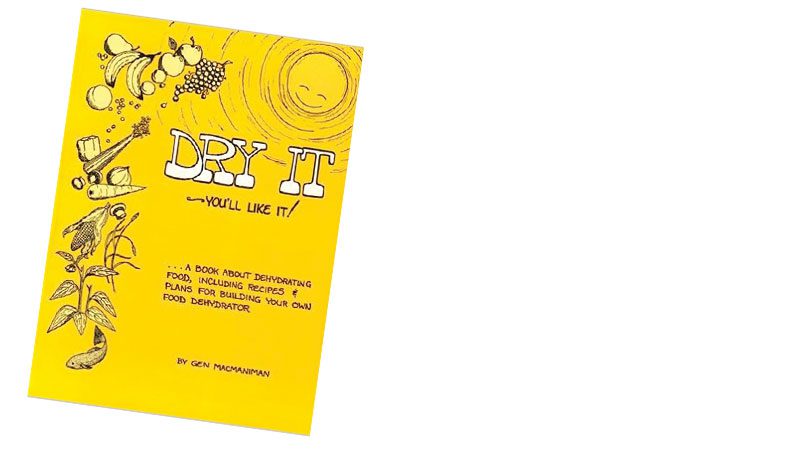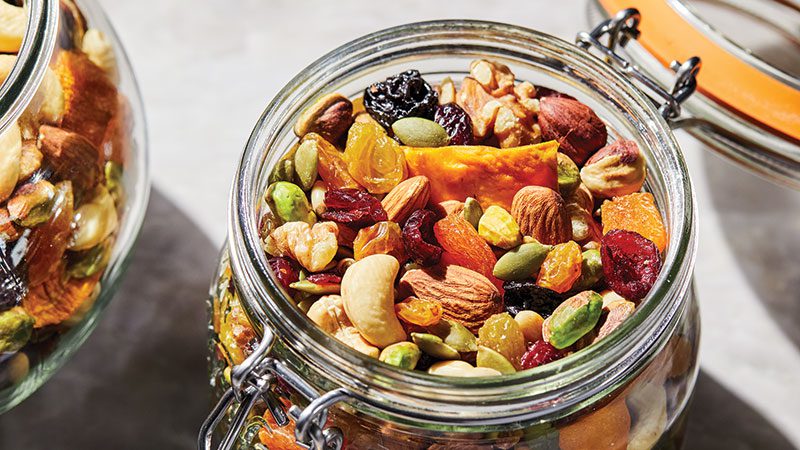“The Seed Woman”
This article was originally published in September 2023

Education was one of PCC’s founding principles as a co-op, and that went beyond cooking.
Sound Consumer readers and visitors to the food fairs organized by Goldie Caughlan (see “Nutrition Education from ‘Ask Goldie’ “) benefited from resourceful locals like Gen MacManiman, known as “the seed woman” for her commitment to sharing knowledge.
MacManiman, who taught at the food fairs and shared recipes with PCC members, authored “Dry It—You’ll Like It,” a 1973 book on dehydrating food, with recipes and instructions on building your own dehydrator. The self-published volume has more than 280,000 copies in print. It shared practical directions for the innovative “warm air generator” heater and fixed-tray design created by her husband, Bob, along with a multitude of recipes. Rhubarb, wild pansies, orange peel and even cottage cheese were on her dehydration list along with more common harvests like apples and mushrooms.
“She dehydrated watermelon! She had examples of just about everything she’d tried to dry in the dehydrator, with a description of the results,” recalled Lindy MacManiman, the youngest of her three daughters. Avocado, Gen MacManiman once told an interviewer, was her sole failure—it became too bitter.
Both Gen and Bob were “kind of pioneer spirits,” their daughter said, with Bob born in rural Illinois and Gen in rural Colorado.
Gen was sickly when she was young, and essentially became an herbalist to save her own life, Lindy said. “In doing so she saved a lot of other people’s lives too.”
The couple came to Seattle, where Bob worked at first for Boeing, then moved near Fall City for a life of self-sufficiency after seeing a newspaper ad for the 36-acre property with its 1910 log house, a chicken house and a barn. Water was supplied through the couple’s own gravity-fed hydraulic water system, and municipal electric power didn’t come to their isolated hill until Lindy was in high school.
Gen was ceaselessly resourceful. A 1954 Seattle Times article described the decorative “Feathergays” she made that were sold in all (at the time) 48 states, corsages made from feathers both from the birds she raised and the pheasants and grouse she would dress for hunter friends.
The vast garden, where she grew and canned hundreds of quarts of fruits and vegetables in her early summers, was like “a medicine cabinet of herbs” to Gen, and she began her dehydration projects drying the herbs she harvested. (Later in life, she ran a flower shop.)
“She was always creating something,” Lindy said.
And Gen’s instructions went beyond simple recipes. She gave advice on air flow, on storage, on intriguing ways to use the foods once it was time to eat them. Her popularity spread from hometown appearances like PCC-sponsored events to national radio shows and trade fairs; she encouraged readers to mail questions to her P.O. Box and she mailed readers a seasonal “Drying Times” newsletter with answers and advice and updates.
At home she lived a frugal, active and happy life. She made fabulous cheese, as well as yogurt, from the goats she kept for decades: “She would go out every day and milk those goats, until she was probably 89 years old,” Lindy said.
Gen died at the Fall City home—“her paradise,” Lindy said—in 2011. “She was most of all a good friend, a caring person, and she wanted to share everything she knew and everything she had learned.”
Even in an era when many people simply buy dried packaged foods off the shelf, her legacy remains in both direct and ephemeral ways—in the still-circulating books, the recipes handed down to new generations, the ethos of supporting nutritious food and reducing waste and sharing knowledge.

